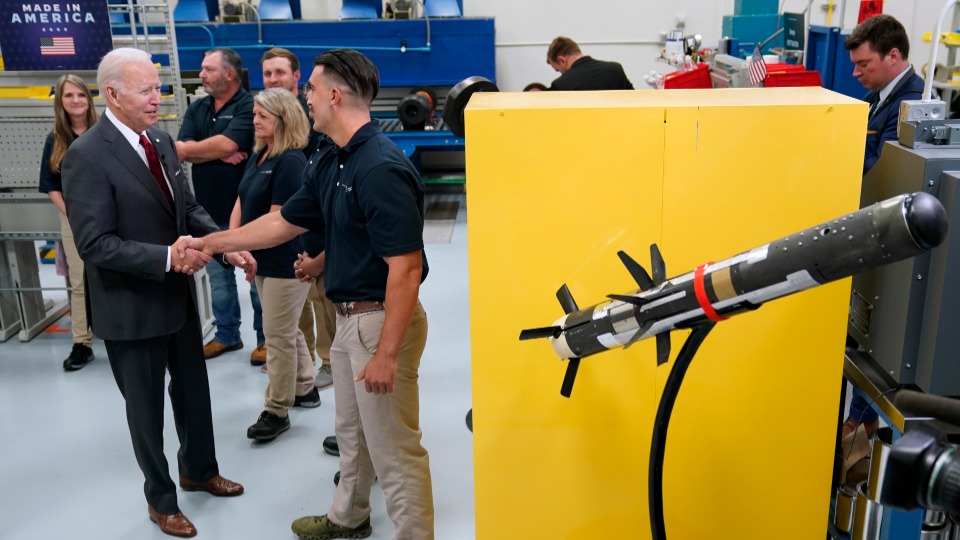
On Jan. 17, 1961, outgoing President Dwight D. Eisenhower appeared on national television to give his farewell address to the people of the United States. In this speech, the former five-star general turned Republican politician had a stark warning about the future:
“In the councils of government, we must guard against the acquisition of unwarranted influence, whether sought or unsought, by the military-industrial complex. The potential for the disastrous rise of misplaced power exists and will persist. We must never let the weight of this combination endanger our liberties or democratic processes.”
Unfortunately, Eisenhower’s warning fell on deaf ears, and today we find ourselves in a country in which our elected representatives put the needs of the military-industrial complex above the needs of their constituents.
At a time when the United States economy is facing many challenges and working-class people can’t afford fuel, baby formula, and other basic necessities, the United States government has eagerly and speedily sent nearly a trillion dollars in military aid to Ukraine. At a time when millions of Americans can’t afford health care, and with over a million deaths due to a still ongoing global pandemic, there is somehow plenty of money for military spending.
In the last six months, the Dow Jones Industrial Average dropped over 2,000 points, the Nasdaq is down more than 3,500 points and the S&P 500 is down nearly 1,000 points. It seems the market valuation of most companies and sectors is dropping fast, yet the stocks of the defense industry are soaring. Lockheed Martin, Northrop-Grumman, General Dynamics, and other big players in the military-industrial complex have all seen their stock prices rise.
How is it that these companies continue to get richer while analysts are speculating that the rest of the economy may be headed for a recession? And how is it that Congress can always find money for military spending, but money for COVID relief, infrastructure, health care, and other projects that would help the working class always seems to be in short supply?
In 2020, Lockheed Martin spent over $12.8 million lobbying Congress and United States government officials. Boeing spent $12.6 million, and Northrop-Grumman spent $11.7 million. There are many more companies in this sector that have given millions to our elected officials, but for brevity’s sake, these are the biggest three examples.
It should be noted that in much of the world, this sort of activity would constitute the crime of bribery, but not in the United States. In the United States, corporations are considered people, and their money is considered “free speech.” Therefore, legal bribery (i.e. lobbying) is welcomed by the powers that be who directly benefit from this morally bankrupt system.
It’s surprising to many that these companies usually split their lobbying money pretty evenly between Republicans and Democrats. While many might associate warmongering with neo-con Republicans, the defense industry has long since realized that both parties have no qualms when it comes to funding warfare. It doesn’t matter to them which party wins an election, because they’ve already bought too many lawmakers from both of them.
We are now in a terrible cycle that seems unbreakable. The military-industrial complex gets rich from war, then uses its riches to lobby Congress to fund more war so they can continue to get richer. This is the cycle that Eisenhower warned against, and unfortunately, it has become reality.
The United States is the only developed country in the world that doesn’t have affordable public health care, but it has 11 aircraft carriers, costing tens of billions of dollars each. Roads and bridges across the country are crumbling and the rail system is antiquated, but the military can easily afford to buy 2,456 F-35 fighter jets at well over $100 million per plane. We are told that forgiving student loans will cost too much, but there are tens of billions of dollars to send to foreign militaries so they can purchase military equipment manufactured by U.S. armaments companies.
How do we break out of this cycle? How do we get a government that works for the people and not the military-industrial complex?
- First is to demand better from our elected officials. Across the country, there are “Move the Money” campaigns trying to pressure local governments to help change the way the U.S. allocates public resources, away from military spending and towards human needs.
- Another important step is revitalizing the peace movement. It wasn’t too long ago that the peace movement in the United States was a real force with which to be reckoned. In the 1960s and ’70s, the peace movement played an important role in forcing Congress to stop funding the U.S. war in Vietnam. Today, the peace movement is much weaker, but it needs to be brought back to its former strength.
- Lastly, it’s important to recognize that as long as the same old Republicans and Democrats that believe corporations are people and money is speech stay in power, nothing will change. Thankfully, across the United States, many people are waking up to the fact that the current system only serves billionaires and millionaires. Socialist parties and organizations are growing across the country and working towards change.
The only way to get the government the people of the United States deserve and need is to put in the work. It’s not an easy job but it’s a job that must be done.
As with all op-eds published by People’s World, the opinions reflected here are those of the author.










